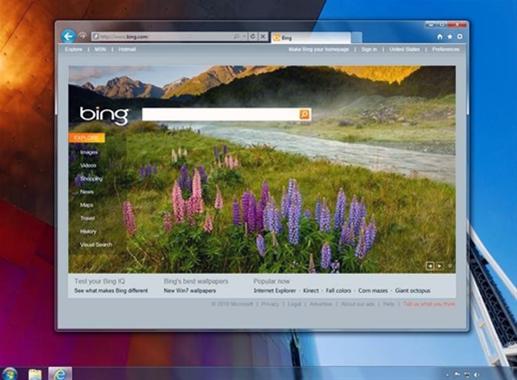

As the Internet becomes such a big part of day-to-day life, it's important for developers to come up with a browser which is simple, clean and convenient for the average user, yet something powerful enough for the needs of those using the 'Net for more intensive purposes. In what is becoming an increasingly competitive industry, developers are coming up with some unique ideas in order to get some sort of edge over competitors. After losing their early dominance in the industry, Microsoft is doing everything they can to rise to the top of the chain once again. With the release of Internet Explorer 9 imminent, we feel it's time to take a look at some of the new features which will play a large part in the structure of a browser looking to take advantage of improving technology.
One of the biggest things Internet Explorer 9 will be trying to do is push HTML 5 to become the standard. There'll be native support for some of the more complicated features of HTML 5, including audio and video, where the aim is to standardise the playback of these files on the 'web. IE9 will showcase just what can be done with HTML 5 with full native support, and looks to make life easier for developers as they try to cram more and more into that simple little thing we call a browser.
Another huge leap we can look to take advantage of is the support for video cards which IE 9 will offer. Though we've seen GPU-acceleration for a few elements before, we've not seen GPU-accelerated HTML before. What does this mean? It means up until now, no browser has been able to have the speed, smoothness and accuracy we could have achieved a few years ago. That said, Internet Explorer 9 will have full support for hardware-accelerated websites right from the word 'go'.
It's obvious that improved performance was always going to play a big part in this browser. Again, a major change will make use of improving technology to make browsing easier. Along with GPU-acceleration, Internet Explorer 9 looks to use multi-core processors to increase performance. The new Javascript engine will use a separate thread to compile scripting - making use of another processor core should it be available. This means we can continue interacting with web pages while IE 9 works in the background to make browsing just that little bit faster.

It also looks we'll see a much cleaner interface this time around!
Of course with every product, there's going to be some disadvantages. With Internet Explorer 9, there will be one especially big drawback - it will not receive any support on Windows XP. As of July 2010, over 50% of people use Windows XP as their operating system. No doubt this accounts for most of the 30% who use IE8 or a previous iteration of Internet Explorer. Microsoft appears to be risking the continued loyalty of their Internet Explorer users by trying to appeal to those on newer operating system. It's yet to be seen whether or not the changes we'll see in IE 9 are enough to drag some attention away from Firefox and the 45% of Internet users it wields, but hopefully everyone gives it a try to check out the cool new advancements in browsing.
Internet Explorer 9 is nearly ready for public beta, with the process launching on September 15.
For the curious, around 40% of MMGN users use Firefox. Around 30% use Internet Explorer, and the remaining 30% is made up mostly of Chrome and Safari users, with minor contributions from smaller browsers. The question in our minds, though: will you make the switch to Internet Explorer 9?




 Company of Heroes 2 – Tips & Tricks
Company of Heroes 2 – Tips & Tricks Metal Gear Solid 5 The Phantom Pain Guide: Border Region Side Ops Guide
Metal Gear Solid 5 The Phantom Pain Guide: Border Region Side Ops Guide What we want from gamescom 2012
What we want from gamescom 2012 DOTA Hero Tips: Ancient Apparition
DOTA Hero Tips: Ancient Apparition Zelda: Is A Link Between Worlds heading in the wrong direction?
Zelda: Is A Link Between Worlds heading in the wrong direction?